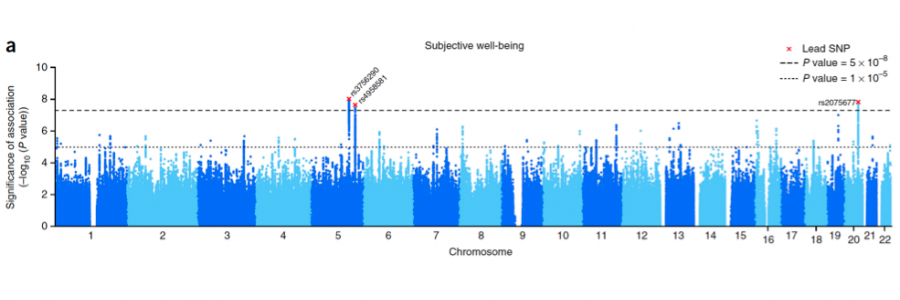
For the first time in history, researchers have isolated the parts of the human genome that could explain the differences in how humans experience happiness.
These are the findings of a large-scale international study in over 298,000 people, co-led by VU Amsterdam professor Philipp Koellinger at the Department of Complex Trait Genetics (CTG lab) at Center for Neurogenomics and Cognitive Research (CNCR). The researchers found three genetic variants for happiness, two variants that can account for differences in symptoms of depression, and eleven locations on the human genome that could account for varying degrees of neuroticism. The genetic variants for happiness are mainly expressed in the central nervous system and the adrenal glands and pancreatic system. The results were published this week, in the journal Nature Genetics.
Genetic influences on happiness
“Psychological well-being is primarily influenced by the environment, but partially also by genetic factors,” explains VU Amsterdam professor Philipp Koellinger. “However, which specific genetic variants are involved was largely unknown until now.” The current study is a milestone in research on the genetic underpinnings of psychological well-being. The authors point out that the genetic associations reported in the study are statistically highly significant, but they explain less than 1% in the variation in happiness in the population. Even larger studies in the future will most likely identify many additional genetic variants that are relevant for psychological well-being.
Says Philipp Koellinger, “Even in the future, genetic data will most likely account for not more than 25% of the differences in well-being in the population. Many genes play a role, but the effects of any particular genetic variant are tiny. Yet, these findings can help us to better understand biological factors that influence mental health and well-being.”
Study is the result of a large, international research consortium
The research effort is the largest ever study into the genetic variants of psychological well-being. It was successfully completed thanks to the assistance of 181 researchers from 17 countries, coordinated by the Social Science Genetic Association Consortium (SSGAC). The SSGAC is a research infrastructure designed to stimulate dialogue and cooperation among medical researchers, geneticists, and social scientists. The consortium was founded by three social scientists (Daniel Benjamin, David Cesarini, and VU Amsterdam professor Philipp Koellinger).